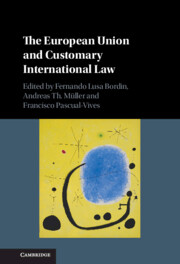Book contents
- The European Union and Customary International Law
- The European Union and Customary International Law
- Copyright page
- Contents
- Contributors
- Acknowledgements
- Cases
- Treaties
- Abbreviations
- Introduction
- Part I A View from the Outside
- 1 Applicability of Customary International Law to the European Union as a Sui Generis International Organization
- 2 Is the European Union a Sui Generis International Organization?
- 3 The European Union’s Role in the Making and Confirmation of Customary International Law
- Part II Looking in Between
- Part III A View from the Inside
- Index
2 - Is the European Union a Sui Generis International Organization?
The Challenge of Arguing for Special Treatment in Customary International Law
from Part I - A View from the Outside
Published online by Cambridge University Press: 27 October 2022
- The European Union and Customary International Law
- The European Union and Customary International Law
- Copyright page
- Contents
- Contributors
- Acknowledgements
- Cases
- Treaties
- Abbreviations
- Introduction
- Part I A View from the Outside
- 1 Applicability of Customary International Law to the European Union as a Sui Generis International Organization
- 2 Is the European Union a Sui Generis International Organization?
- 3 The European Union’s Role in the Making and Confirmation of Customary International Law
- Part II Looking in Between
- Part III A View from the Inside
- Index
Summary
The EU is often described as a sui generis international organization. While this is an apt description in some ways, it is far from self-evident that the special features that the EU exhibits are or should be part of the explanation of why and how it is bound by customary international law. This chapter seeks to show that, in the eye of public international law, the EU is not yet in a category of its own which would justify or otherwise affect the applicability of custom to it. It does so by investigating whether a special category of ‘regional economic integration organizations’ (REIOs) has emerged to which international law grants ‘preferential’ treatment, with a focus on three rules that were unsuccessfully proposed to cater for the specificities of the EU in codification projects carried out by the UN International Law Commission. The chapter also considers doctrinal and normative reasons why calls to distinguish the EU from other international organizations under customary international law have fallen on deaf ears, while recognizing the role that the EU has played in widening the horizons of the law of international organizations.
Keywords
- Type
- Chapter
- Information
- The European Union and Customary International Law , pp. 48 - 65Publisher: Cambridge University PressPrint publication year: 2022



